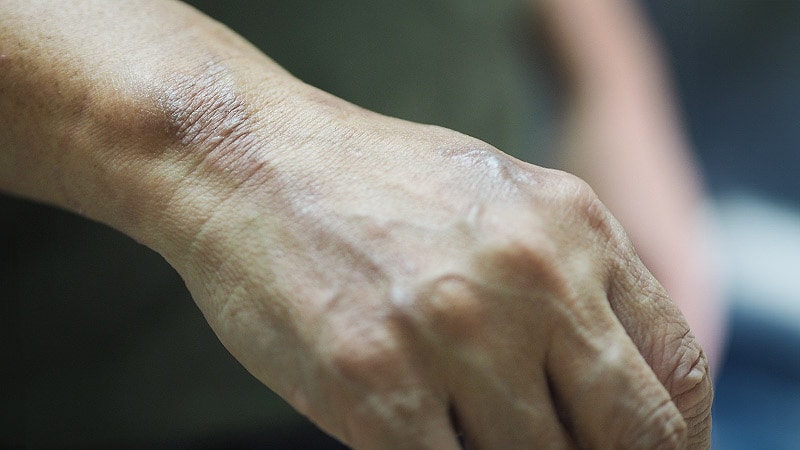TOPLINE:
Smoking, higher body mass index (BMI), and previous exposure to biologics were linked to poorer responses to biologics among patients with psoriasis, in a meta-analysis.
METHODOLOGY:
Researchers conducted a search of studies evaluating biologic treatments for psoriasis in PubMed, Embase, and Web of Science through April 2022.The meta-analysis included 40 studies with a total of 21,438 patients with psoriasis, focusing on Psoriasis Area and Severity Index (PASI) 90 outcomes.Of the 40 studies, nine were randomized clinical trials (RCTs), and 31 were observational studies and were analyzed separately.
TAKEAWAY:
Older age (odds ratio [OR], 0.99; 95% CI, 0.98-1.00), previous biologic exposure (OR, 0.44; 95% CI, 0.29-0.67), higher BMI (OR, 0.96; 95% CI, 0.94-0.99), smoking history (OR, 0.81; 95% CI, 0.67-0.98), and current smoking (OR, 0.78; 95% CI, 0.66-0.91) were negatively associated with achieving PASI 90 at 6 months in observational studies.In RCTs (which did not evaluate age), only a BMI ≥ 30 showed a negative association with treatment response, ie, a PASI 90 at 3 months (OR, 0.57; 95% CI, 0.48-0.66).There were no significant associations between treatment responses and other clinical characteristics including patient sex, diabetes, hypertension, psoriatic arthritis (PsA), and disease duration in the observational studies. RCTs also evaluated patient sex and PsA and found no association between those characteristics and response.
IN PRACTICE:
While the study found evidence that older age, prior biologics exposure, higher BMI, and smoking were negatively associated with outcomes among patients treated with biologics for psoriasis, “there is a lack of evidence regarding whether these effects, as well as others, vary by biologic therapy,” the authors wrote. “Future studies on this topic may guide clinicians to stratify treatment based on patient characteristics,” they added.
SOURCE:
The study was led by Gustav Hjort, MS, and Christopher Willy Schwarz, MD, Department of Dermatology and Allergy, Copenhagen University — Herlev and Gentofte, Copenhagen, Denmark. It was published online on June 18, 2024 in JAMA Dermatology.
LIMITATIONS:
The study’s reliance on data from previously published studies may introduce citation bias, and differences in study designs and patient populations of the studies could affect the generalizability of the findings. The analysis did not differentiate between the effects of various biologics, which could influence treatment outcomes.
DISCLOSURES:
Hjort and Schwarz had no disclosures to report. One author reported grants from Novartis, Bristol Myers Squibb, Janssen Pharmaceuticals, BMS, Sanofi, and Almirall paid to the hospital and personal fees from AbbVie, Eli Lilly, Novartis, Pfizer, LEO Pharma, Janssen, UCB, Boehringer Ingelheim, Bristol Myers Squibb, Galderma, Almirall, and Sanofi as a consultant and speaker outside of the submitted work. The remaining author reported personal fees from Sandoz, Janssen Cilag, and Eli Lilly as a speaker outside of the submitted work.
This article was created using several editorial tools, including AI, as part of the process. Human editors reviewed this content before publication.
>>> Read full article>>>
Copyright for syndicated content belongs to the linked Source : Medscape – https://www.medscape.com/viewarticle/clinical-characteristics-may-affect-biologic-treatment-2024a1000bb1
